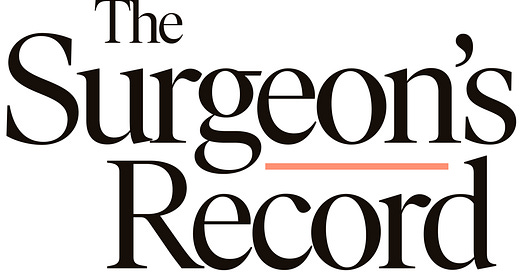A rundown of stories from across the healthcare ecosystem — health tech, health policy, digital health, value-based care, and more — with commentary.
Presented by Commons Clinic
This week:
This is CVS — but for how much longer?
Is Medicare Advantage salvageable?
Newsom vetoes a controversial bill (not that one, the other one)
More details on Massachusetts’ expensive Steward takeover
AI in Healthcare: The Patient’s Perspective
The surprising reason EHRs are terrible
Closed mouth, open mind
Exclusive: CVS explores options including potential break-up, sources say (Reuters)
Healthcare giveth, and healthcare taketh away. CVS once seemed poised to be a major healthcare player. The company has retail stores, an insurance arm (Aetna), a PBM (Caremark), and care delivery capability (Oak Street Health). But the disparate parts don’t haven’t coalesced into a successful strategy. Analysts are pointing to the retail stores as the weak link, but the Medicare Advantage business is also struggling (see below). One potential solution: convert retail stores into care delivery locations. Could Oak Street expansion support that? Probably not. Rumors are that CVS is seeking a private equity partner to fund further OSH growth. Whatever happens, CVS’ struggles feel like the beginning of a cycle shift. Big bets just aren’t panning out, and a retrenchment (or full retreat from some areas) seems likely. What comes next is anyone’s guess. Could we see a return to fundamentals (traditional healthcare delivery focused on the doctor-patient relationship) with an innovation flair (evolved practice models with thoughtful tech implementation)?
Quality ratings hit to key Medicare plan shakes Humana stock (AP News)
As pretty much everyone predicted, Medicare Advantage headwinds are picking up, and the suffering has begun. Star ratings have tanked. Upcoding is under intense scrutiny. The golden goose is laying rotten eggs. What’s left to say that hasn't already been said? Here are two excellent takes: one by Blake Madden and the other by Wendell Potter. A lot of healthcare delivery innovation seems to center around Medicare Advantage. It’s one of the few reimbursement pathways to a viable business model for many startups. Traditional Medicare programs are less predictable and come with downside risk. Commercial insurers are harder to engage and slower to adopt. Employers may be willing, but there’s point solution fatigue, skepticism about ROI, and lots of red oceans. From an absolutist viewpoint, the theory of Medicare Advantage is sound — better care, more benefits, a focus on quality and value, etc. Is the program salvageable or have perverse intentions pushed it to the point of no return? Perhaps there’s an opportunity to run into the fire here and prove that MA can be done well and right.
Newsom vetoes bill to let California ban private equity deals for health care (Axios)
Governor Newsom also vetoed an AI regulation bill which got a bit more attention (at least in the news sources I frequent). We covered CAB 3129 and its potential unintended consequences in a prior TSR post. The primary focus of the bill was to increase scrutiny of private equity healthcare acquisitions. But there was fear CAB 3129 would hinder innovation by restricting VC-backed health startups. Newsom justified the veto by arguing that CAB 3129 improperly shifted review from the state’s Office of Health Care Affordability to the Attorney General. Essentially, he found CAB 3129 to be redundant. For now, the friendly-PC model lives on in California. I’m a proponent of MSOs and MSO-like structures. They allow physicians to maintain independence while giving them the resources to compete in an increasingly difficult environment. VC and PE activity in healthcare is understandably controversial. But absolutism gets us nowhere — few things are all good or all bad. If we are on the cusp of a new healthcare cycle (see above), keeping all innovation options open increases the possibility of finding good solutions.
Governor Healey Announces Actions to Save Remaining Steward Hospitals (Mass.gov)
When these deals were first announced, I was curious about the terms and how much money the state was committing to facilitate the Steward hospitals’ transition. Now we have some details. Massachusetts will spend an estimated $489 million over three years to support the new owners. Keeping these hospitals open is a win for patients and access. But half a billion dollars is a hefty sum. Some are estimating the total cost could go as high as $700 million. Yikes. Could this debacle have been avoided or had its impact lessened? For years Steward refused to comply with a Massachusetts rule that required all hospital systems to share detailed financial information. Steward repeatedly submitted incomplete, redacted statements, and continually battled the state, arguing that Massachusetts was overstepping its bounds. Turns out they had a lot to hide. Steward lost nearly $1 billion leading up to 2020 and had a net worth of -$1.5 billion. Meanwhile, the Steward Health Care board looked the other way (or worse). The numbers are staggering, and the full financial fallout won’t be known for years — if ever.
There's a tendency to overestimate patients’ interest, familiarity, and comfort with healthcare technology. Proximity and confirmation biases are at play here, and it extends to those of us in healthcare who are bullish on tech. While this is just one example, I suspect Dr. Fitzpatrick’s video is representative of how many patients feel. There is a middle ground somewhere between dismissive clinician skepticism and the “AI will replace doctors” crowd. AI is here to stay. Eventually we’ll get to lasting, useful, and safe applications. It's unfortunate we have to go through yet another hype cycle and round of tech > doctors discussions to get there. The key to using any generational AI model effectively is finding the right prompts and having the domain expertise to spot hallucinations, inconsistencies, and inaccuracies. Healthcare applications are no different. Most patients still want to form relationships with their care providers. Tech can and will be an enabler. But we shouldn’t underestimate the importance of human interaction.
Why EHRs are ruining health care: a doctor's shocking truth (KevinMD)
EHRs get a lot of hate from clinicians. They’re one of the most frequently cited causes of burnout. They’ve eroded the doctor-patient relationship. To this day, paper medical charts still hold advantages over EHRs when it comes to ease-of-use and efficiency. EHRs are clearly not the best the tech world has to offer when it comes to UX/UI. The fundamental problem with EHRs is regulatory — not technological. Death by a thousand clicks comes from the need to endlessly satisfy spurious policies, protocols, and billing requirements foisted on frontline providers by administrators and regulatory bodies like the Joint Commission. Every EHR update is dominated by yet another checkbox concocted by someone who never has to use it. EHRs are bloated — filled with pages of cut-and-paste word salad, too much noise and not nearly enough signal, and interfaces that would make Windows Me blush. We won’t get the tech we deserve until we stop treating EHRs as vehicles for billing and over-protocolization.
ICYMI: 6 Reasons Doctors Can't Get Their Act Together (The Surgeon’s Record)
Our article last week was about the forces preventing doctors from affecting high level healthcare change. A TSR reader suggested a seventh reason: ego. He’s not wrong. Humility and emotional intelligence will go a long way in leading us out of this mess. Surely, doctors aren’t alone in letting ego get in the way of progress. But there’s a fine line between advocating for ethical standards and being outright obstructionist and protectionist. It’s hardwired in us to be right and be the smartest/loudest voice in the room. These qualities are ingrained early on in our training. In a competitive field like medicine, it’s how you stand out and get ahead. But we can’t and don’t know it all. We don’t always have to prove we’re the smartest people in the room. Finding the balance between asserting clinical expertise and maintaining a growth mindset is one of the biggest challenges facing clinicians looking to join startups. Keeping a closed mouth and open mind has its benefits.






